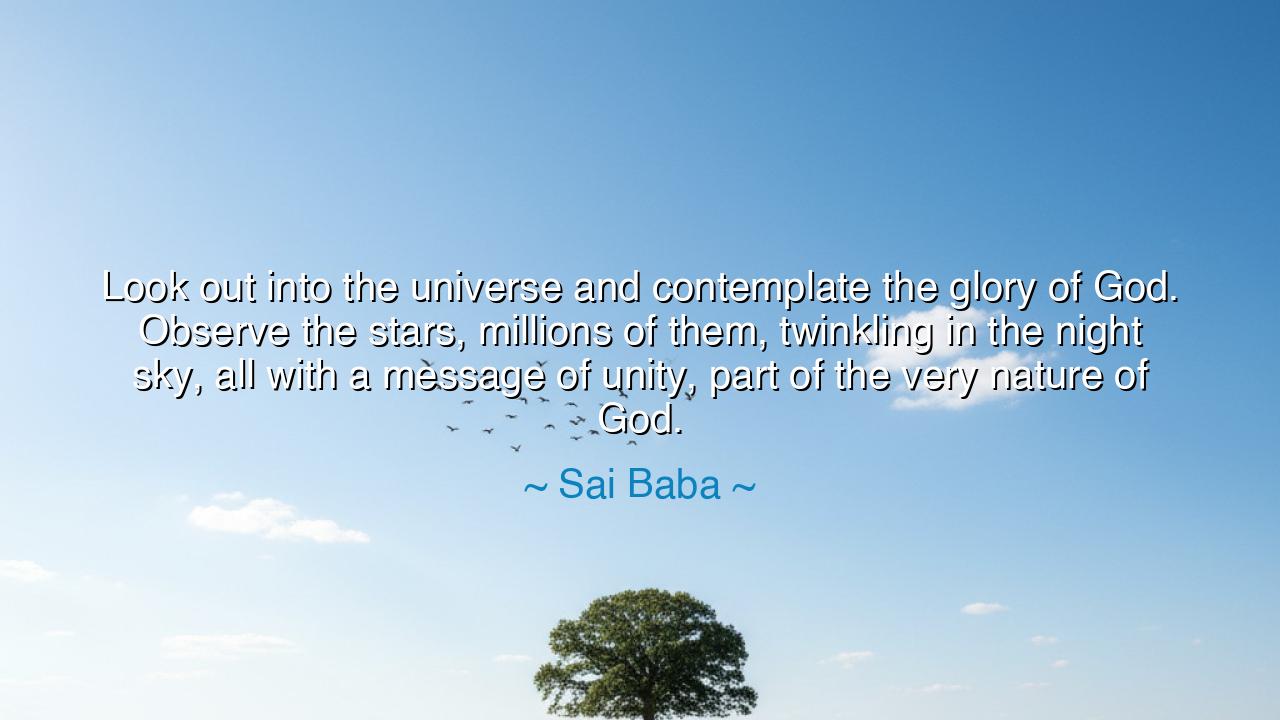
Look out into the universe and contemplate the glory of God.
Look out into the universe and contemplate the glory of God. Observe the stars, millions of them, twinkling in the night sky, all with a message of unity, part of the very nature of God.






“Look out into the universe and contemplate the glory of God. Observe the stars, millions of them, twinkling in the night sky, all with a message of unity, part of the very nature of God.” — Thus spoke Sai Baba, the mystic teacher of India, whose words bridged the worlds of spirit and science, of heaven and heart. His voice, like a song of the cosmos itself, calls us to lift our gaze from the dust of our daily concerns and behold the infinite tapestry above us. For in the vastness of creation lies not chaos, but divine order; not isolation, but unity. Every star, every beam of light, every whisper of the heavens declares that we are not alone — that all things, seen and unseen, are bound together by the one eternal Spirit that breathes through all.
In this saying, Sai Baba reveals a profound truth: that the universe itself is the scripture of God, and its stars are words written in light. To those who have eyes to see, every glimmer in the night is a reminder of divine intelligence — a harmony too vast for chance, too beautiful for accident. When he spoke of the stars as “a message of unity,” he meant that the infinite diversity of creation — the galaxies, the worlds, the souls — are all threads in the same cosmic fabric. What divides us on earth is illusion; what unites us in spirit is truth. For just as the stars shine with different colors yet share the same light, so too do all beings express the same divine essence, wearing different forms yet sharing one source.
Sai Baba, a teacher who lived in the twentieth century, sought to awaken mankind to this oneness of existence. In an age driven by materialism and conflict, he urged humanity to rediscover the sacred in the ordinary — to see God not as a distant ruler, but as the very breath within all creation. His words about the stars were not meant for astronomers alone, but for every soul who has forgotten how to wonder. “Look out into the universe,” he said — not merely with your eyes, but with your spirit. For when we truly behold the heavens, we remember that we too are made of stardust, born of the same light, sustained by the same divine will.
The ancients, too, understood this mystery. The sages of old — from the Vedic seers of India to the philosophers of Greece — looked to the stars not just to mark seasons or guide ships, but to discern the pattern of the Divine Mind. Pythagoras spoke of the “music of the spheres,” the cosmic harmony sung by the movements of celestial bodies. The Upanishads, sacred texts of India, proclaimed that “as is the microcosm, so is the macrocosm” — that man and the universe reflect one another, both temples of the same Spirit. Sai Baba’s words are the echo of this eternal wisdom: that to understand God, one must first see the unity that binds all creation together.
Consider the astronaut Edgar Mitchell, who, upon returning from the moon, described an overwhelming realization — that everything in existence is connected, that separation is an illusion. As he gazed upon the Earth from space — a small, blue gem floating in the vast sea of stars — he felt what Sai Baba called “the message of unity.” It was not a thought, but a revelation: that humanity, nature, and the cosmos are one great organism, pulsing with divine energy. Mitchell called it an “epiphany,” but in truth, it was the awakening of a truth known to the saints and mystics for ages.
Yet Sai Baba’s teaching carries more than poetry — it carries responsibility. For if all creation is part of the divine, then to harm it is to wound God Himself. The forests, the oceans, the air, the animals — all are expressions of the same sacred life. When mankind forgets this unity, greed and division follow. But when we live in awareness of it, compassion flows naturally. Thus, to “contemplate the glory of God” is not only to admire the stars, but to act with reverence toward all that lives under them. The universe teaches us harmony; it is we who must learn to sing in tune with it.
Therefore, let this wisdom dwell in your heart: you are not apart from the cosmos — you are part of it. The same light that burns in the stars burns in you. Look often to the heavens, not in despair of your smallness, but in awe of your belonging. Let humility be born from wonder, and strength be born from unity. Treat every being — human, animal, or tree — as kin, for all are children of the same eternal flame.
And when the night is still and the sky above you shimmers, remember the words of Sai Baba: the stars are not distant strangers but silent teachers, each shining with the same message — that God’s glory is not scattered but shared, not confined to one creed or one corner of the world, but radiant in all creation. Look up, then, with eyes of reverence and a heart of gratitude, and let the infinite whisper to you: all is one, and one is God.






AAdministratorAdministrator
Welcome, honored guests. Please leave a comment, we will respond soon